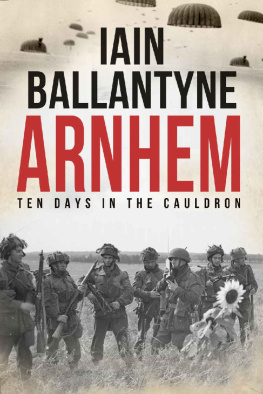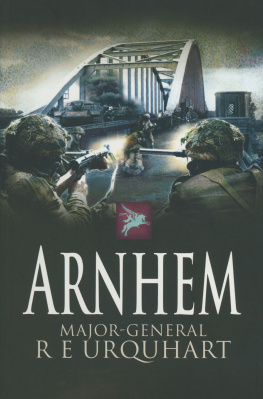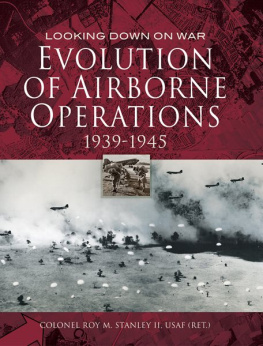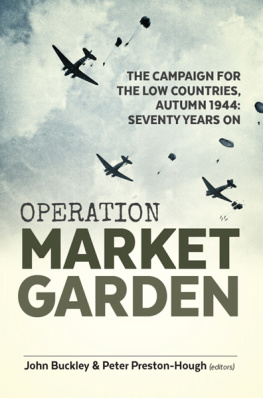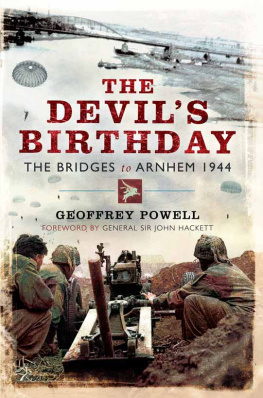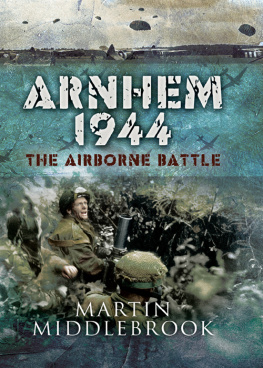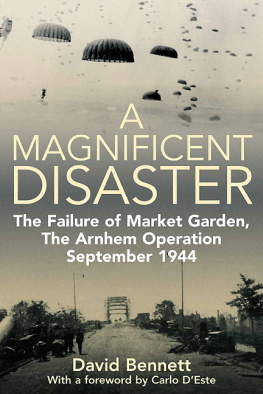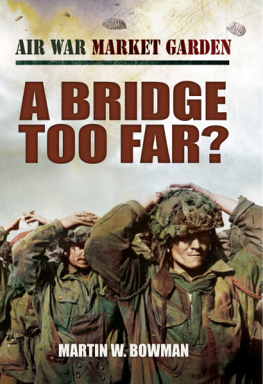Dedicated to any future generation in a World of the Free, of whom my grandchildren Danil, Robijn and Iris Kuiper are dearest.
Arnhem and the Aftermath
Civilian Experiences in the
Netherlands 194045
Harry Kuiper
First published in Great Britain in 2019 by
Pen & Sword Military
An imprint of
Pen & Sword Books Ltd
Yorkshire - Philadelphia
Copyright Harry Kuiper, 2019
ISBN 978 1 47387 098 7
eISBN 978 1 47387 100 7
Mobi ISBN 978 1 47387 099 4
The right of Harry Kuiper to be identified as Author of this work has been asserted by him in accordance with the Copyright, Designs and Patents Act 1988.
A CIP catalogue record for this book is available from the British Library.
All rights reserved. No part of this book may be reproduced or transmitted in any form or by any means, electronic or mechanical including photocopying, recording or by any information storage and retrieval system, without permission from the Publisher in writing.
Typeset in Ehrhardt by
Mac Style
By TJ International Ltd.
Pen & Sword Books Ltd incorporates the Imprints of Pen & Sword Books Archaeology, Atlas, Aviation, Battleground, Discovery, Family History, History, Maritime, Military, Naval, Politics, Railways, Select, Transport, True Crime, Fiction, Frontline Books, Leo Cooper, Praetorian Press, Seaforth Publishing, Wharncliffe and White Owl.
For a complete list of Pen & Sword titles please contact
PEN & SWORD BOOKS LIMITED
47 Church Street, Barnsley, South Yorkshire, S70 2AS, England
E-mail:
Website: www.pen-and-sword.co.uk
or
PEN AND SWORD BOOKS
1950 Lawrence Rd, Havertown, PA 19083, USA
E-mail:
Acknowledgements
M y nieces, nephews and other people deserve my thanks for having shared their war-time memories on behalf of the manuscript of this book. Most were living in Arnhem and the area between 1940 and late September 1944, and were evicted like my parents and myself. While most of us were born in the thirties, we were young when events caught us by surprise and made a great impression on us. For many young children, real war-time experiences can be mental baggage for the rest of their lives. This has resulted in very strong personal memories with each of those interviewed. Next, a few dairies could be used. These and some other original documents are in the hands of their children, who all became more invaluable sources of this truthful book.
They were experiences on the smallest possible scales. We all, however, knew reasonably well about each others war-time experiences. They were often relived in family circles. Fortunately, all those interviewed were available for a number of interview sessions. The advantage was that common personal experiences were explained which, when twisted or mixed up with other memories, could be evaluated by others without much reserve. Here, they are placed against the back-ground of the greater events of this war.
Chapter One
Pig Food in Those Days: Seasoning the Aftermath
T asteless thin porridge, cooked in rye and too much water, became a standard lunch-time meal at our home in January 1945. This was during the Hunger Winter in the western part of the Netherlands. My parents had found accommodation with my grandmother in the small town of Breukelen, north of Utrecht city. The population of Arnhem, our home town, and a number of neighbouring towns had been evicted, following the German repulse of British and Polish forces involved in Operation Market Garden in late September 1944.
Once the Allied soldiers were out, Arnhem and a few nearby towns were treated as spoils of war by the Germans. About 170,000 civilians involved were evicted within one to three days. The city and a number of neighbouring towns such as Oosterbeek were deserted; virtually no citizens were left. Germans, mainly from the Ruhr, were encouraged by the German occupiers and some Dutch collaborators to take anything they wanted from private houses, shops or any kind of store. Furniture, bedding and other common household property were taken to compensate for what German families have lost in the Allied bomb raids as they reasoned. They left with trucks and trailers loaded, as secretly taken pictures show. The citys stockpiles were removed as well, as much as possible. Wehrmacht and SS officers took wines from shops and animals from Arnhems zoo for sumptuous party dinners. Certain kind of ladies were paid with jewellery and fur coats stolen from shops, as hidden eye-witnesses recorded.
At the same time, common provisions were no longer available north of the countrys main river, as the Germans purposely blocked all food and coal supplies to the western part of the country. The Nazi purpose was to starve as many as possible. About 4.5 million people suffered from this man-made famine, which also had nothing to do with Market Garden. Moreover, 1944/45 was a very cold winter; 20,000 to 25,000 citizens are believed to have died and by early May 1945 many were on the verge of starving. Others, especially youngsters, have been affected by hunger all their lives. The actress Audrey Hepburn, who lived in Arnhem during the war as a young teenager, was one of these. This author and most compatriots interviewed for this book experienced the same kinds of fate.
Porridge cooked in rye and water was a mucky replacement of any minimal meals as offered in the soup kitchens of most towns. The grey and somewhat brown porridge without a grain of salt or sugar because, who had salt or sugar? was just disgusting. Citizens of Amsterdam joked about the situation in their own way. If I had bacon, they would say to each other, I would prepare bacon and eggs, if I had eggs. Next to the taste of the porridge, there were the sharp husks that filled my mouth with every reluctant little bite. When finished, a crown of husks covered most of the rim on my dish. But a crown of distaste, that is what it really was. For most months during the Hunger Winter in early 1945, it was one of only two or three daily meals. A dish of porridge in rye and water was too little to survive on and too much to die from, even for this 5-year old. For many decades it was one of several bad memories of the Second World War.
One day and very angry with this filthy porridge as usual, I exploded. Ik vreet die rotzooi niet meer (I shall eat this nasty scrap no longer). Silence followed. Because what was that from this little boy? Nasty scrap? And: vreet (as larger animals like pigs do) instead of eet, as decently brought up children are supposed to say? That was unheard of! That might deserve a stern reprimand; like from a Dutch uncle, as the British say. There was no uncle and no reprimand. For a moment, my parents looked at each other and hesitated. Just by nodding, my father left it to my mother. She could not disagree with me and said in a soft voice, You better eat it, dear son! People in Amsterdam dont have anything to eat at all. And this was true. Pictures show youngsters in Amsterdam scraping dustbins in the streets during this Hunger Winter.


